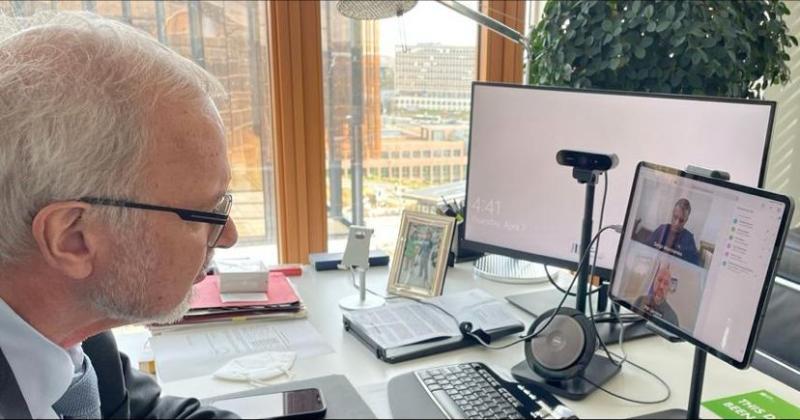The European Investment Bank plans further measures to support Ukraine, in addition to the nearly €670 million in emergency lending delivered in March, EIB President Werner Hoyer told Ukrainian Prime Minister Denys Shmyhal in a phone conversation Thursday.
Prime Minister Shmyhal and President Hoyer discussed the economic consequences of the Russia invasion and the need to rebuild roads, bridges, buildings, power lines, heating and water supplies. Hoyer emphasised that the EIB’s initial emergency financing represented the profound support the institution continues to demonstrate for Ukraine, a country in which it signed about €8 billion in loans before the Russian invasion. Ukrainian Finance Minister Serhii Marchenko also joined the call Thursday.
President Hoyer assured Mr. Shmyhal and Mr. Marchenko that the whole EIB Group “stands in solidarity with the Ukrainian people, and remains fully engaged in efforts alongside its partners to support Ukraine.”
The EIB Group has invested in Ukraine since 2007. After Russia annexed the Crimean Peninsula and occupied two large parts of eastern Ukraine in 2014, the Bank approved a €200 million loan to assist people who fled the conflict and the towns that accepted them. The Bank later approved a second recovery loan worth €340 million and received about 900 new project proposals. This financing is on hold during the conflict, but the Bank now envisages an expanded support package – in addition to the €668 million already disbursed.
“I have listened carefully to the prime minister’s account of the situation in the country,” Hoyer said. “I am deeply grateful for his insight, which was invaluable as we work to ensure that we provide all available help in the most effective and relevant way for Ukraine’s needs. In partnership with the European Council, the Commission and Parliament, we stand ready to accelerate the delivery of an additional €1.3 billion in the coming months.”

Assisting Ukraine and neighbouring countries
Shmyhal, who is in charge of the country’s rebuilding process, thanked Hoyer for the assistance and expressed optimism that the partnership between the European Investment Bank and Ukraine will be strengthened. During the conversation, the Ukrainian prime minister listed many areas of the country damaged in recent months, detailing the infrastructure challenges and humanitarian difficulties that result. The EIB Institute is coordinating a €2.5 million humanitarian package to provide food, water, medicine, protection and trauma care for Ukraine and neighbouring countries.
“I’m grateful to the Bank and the European Union for consistent financial support,” Shmyhal said.
Parts of Ukraine experiencing the heaviest fighting need assistance in dozens of sectors, Shmyhal said during the call, including transport systems, sewage and water pipes, sanitation services, industrial warehouses, large residential apartment buildings, fuel lines, health care services such as ambulances, pharmacies, and mobile communication towers.
The European Investment Bank’s €668 million emergency lending to Ukraine covers urgent financing needs. The upcoming €1.3 billion financing will cover critical infrastructure in transport, energy, urban development and digital technology. The Bank is working with partners across the European Union on this expanded package to help Ukraine and neighbouring countries address the refugee crisis and other problems caused by the war.
“In these tragic war days, we will do all we can for the country,” Hoyer said, “and the EU Bank will be there when the country sets about rebuilding and recovering.”